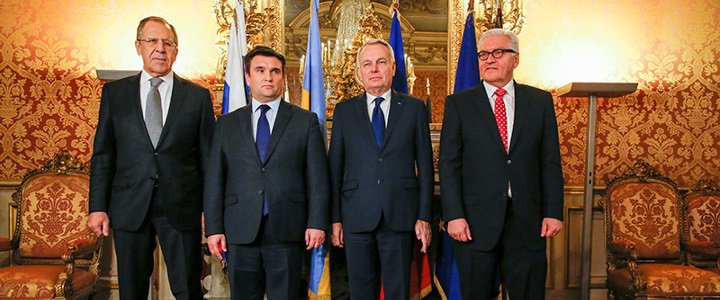Ukraina - Ministrų susitikimas ,,Normandijos formatu’’ - Užsienio reikalų ir tarptautinio vystymosi ministro p. Jean-Marc Ayrault pareiškimas po susitikimo (2016 m. kovo 3 d.) [fr]

Ladies and gentlemen,
We are gathered here today in the Normandy format to examine the proposals submitted to us by the OSCE. These proposals were discussed at the last ministerial meeting, which was held in Munich at the start of February. Those discussions covered three specific points, which formed the agenda for this evening: consolidating a real ceasefire, establishing the arrangements for local elections in the Donbass region, and ensuring the security of those elections.
Today’s discussions took place in an environment of straight talk and frankness, without waffle or jargon, and enabled us to make progress on a number of crucial issues.
First, with regard to consolidating the ceasefire, there are several aspects to consider.
An actual ceasefire also requires withdrawal of weapons. We called on the parties to publicly reaffirm their commitment to refraining from all weapon use in the security zone, including for training purposes. In this regard, we welcomed the agreement reached in Minsk yesterday in the framework of the trilateral contact group and we called for its swift implementation.
We called on the parties to provide, without delay, all the information needed for the monitoring and effective verification by the OSCE of the withdrawal of all heavy weapons.
We also called on the parties to complete the withdrawal of heavy weapons. I mentioned this several times during the discussion; it was one of the topics in this discussion, which, ultimately, went well.
Commitments were also made with regard to the effective monitoring, control and coordination of the ceasefire.
We called on the parties to give the OSCE Special Monitoring Mission to Ukraine (SMM) full, unrestricted access.
We called for the Joint Centre for Control and Co-ordination (JCCC) to be able to identify those responsible for breaching the ceasefire and make sure that the necessary steps are taken to prevent them from doing so again.
We called for the establishment of an incident prevention and settlement mechanism, by 30 April 2016, in liaison with the OSCE SMM.
Lastly, as regards the humanitarian and socio-economic aspects, we welcomed the agreement reached yesterday, also in Minsk, on mine clearance, and we called for it to be implemented rapidly and fully.
We called for international humanitarian assistance to be given unlimited, unobstructed access to the civilians who need it in the areas affected by the conflict. At present, many NGOs no longer have any access; it was therefore important for a commitment to be made on this issue this evening.
We also called for the liberation and exchange of all prisoners and all people held illegally by 30 April 2016. The International Committee of the Red Cross also needs to be guaranteed access to all those being held as a result of the conflict.
Now we come to the second major theme: the arrangements for local elections in the Donbass region.
We examined the OSCE proposals, which concerned, in particular, the electoral system, management of the elections, and the role and participation of the political parties. We highlighted how important it was for the Ukrainian parliament and government to draw up and adopt an electoral bill, to enable the local elections to be held, and we expressed our wish that these local elections take place before the end of the first half of 2016, in line with the time frame adopted by the Heads of State and Government in Paris on 2 October 2015. The ministers discussed compromise solutions regarding the election arrangements. In addition, proposals were made by the OSCE political working group and we reaffirmed the importance of respecting the Ukrainian electoral act and international standards in the organization of these elections.
Lastly, the third topic on the agenda this evening: ensuring the security of the elections.
In this regard, we called on the OSCE to provide, by 31 March, concrete, practical options for ensuring adequate security at the elections; it is true that this issue is, above all, the parties’ responsibility, but at the same time, we felt that elections could not be held if their security was not ensured.
As you can see, these discussions were fairly lengthy, but the thorough discussions that took place this evening were, as I said, frank and direct, showing a desire for progress, even if our progress is only gradual. We made progress on various concrete issues and that was my aim. We have avoided, as I said, rewriting history. We have used the Minsk agreements as a starting point, a form of road map, and we need to remain fully mobilized if we are to achieve a real result. In any case, that is my belief this evening.
We have set a number of targets and drawn up a work schedule for the coming weeks, so that we may continue working in the Normandy format, because it is the right approach. At the same time, at each meeting, we need to move a step forward. Nothing would be worse than meeting for nothing, which is not the case this evening. Our aim - or at least, my aim and that of Frank-Walter Steinmeier when we travelled to Kiev a few days ago - is to find solutions to this particularly difficult conflict.
Russia and Ukraine need to play a full part in the success of these commitments. We know that there is still much work to be done in that regard and for the process to succeed, but we are confident because there is a will, or at least, there was a will to organize this meeting in Paris - and no doubt to organize others. In any case, this evening we have taken a step forward. There is some way to go, but we are on the right track, the right path, and we will keep going, with the greatest determination and clarity.
Thank you./.